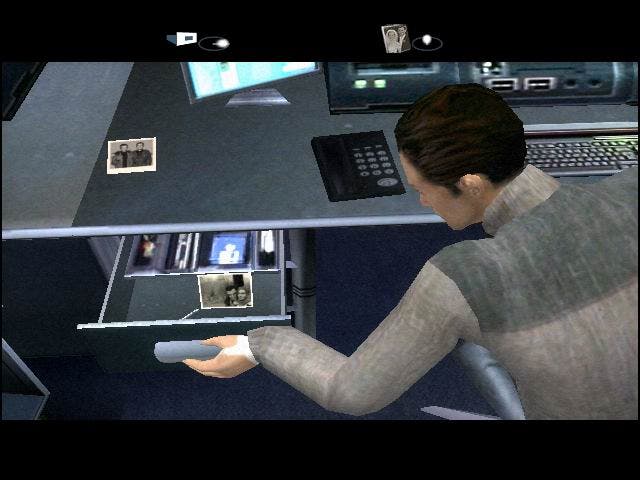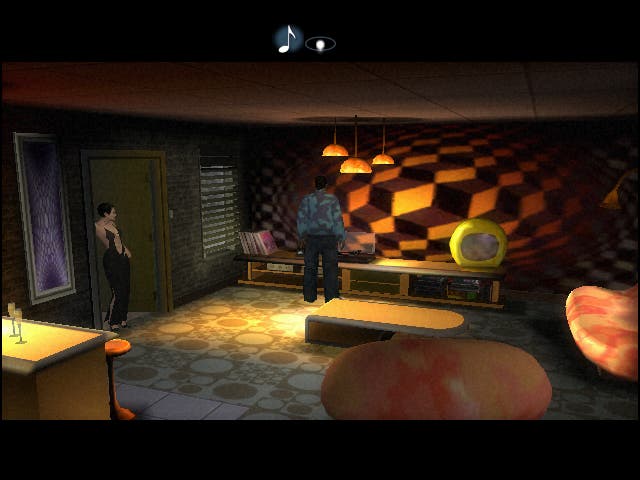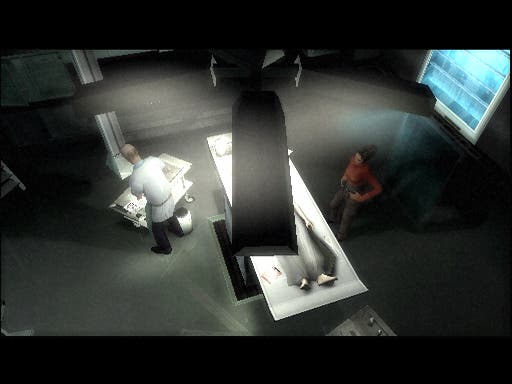Fahrenheit
Just what informs your ability to get away with murder?
In a week that's seen Hilly Bandwagon Clinton roaring sanctimoniously about the horrors of a bit of poorly animated rough-and-tumble in Grand Theft Auto, it's interesting that we've spent parts of the weekend wrapped up in a game that demonstrates better than any other that life experience as a whole holds a magnet to your moral compass, not the patterns of behaviour bred in the average gamer.
In other words, a game that makes you try and think like the perfect killer, not the perfect gamer, and shows you that the two have little to do with one another. Most of our ideas for getting away with it grew out of our experience of real life as acted out on TV or in the pages of murder mysteries, not to mention our common sense. Not our ability to direct a crosshair on the street of Los Santos. Does pressing buttons in the right order to "succeed" at poorly animated sex acts really corrupt us?
So then, we've been playing Fahrenheit again. As you may remember from our previous talk of the game, it's something of a murder mystery - played not just from the perspective of the killer, but also, in our limited demo version, in the role of the two cops initially sent out to investigate the murder he committed.
The twists are many. The killer, Lucas Kane, apparently had no control over himself as he brutally knifed a random man in the Gents at a New York diner in the middle of the night, and his actions immediately after the event as he regains control of himself dictate the level of success detective Carla and her partner have when they reach the crime scene, not just the amount of scouring you do with your prosthetic analogue hand.
But the really fascinating thing for this seasoned gamer is that each scene doesn't play out; you play out each scene. That may sound like double-talk, but it's a crucial distinction.

As becomes apparent in the clever pre-game tutorial that has a digital version of writer/director David Cage walk you through the mechanics, Fahrenheit is more than a game about choice; it's a game about instinct. When you first take control of Lucas your primary instinct is to escape the crime scene. As in life, your own safety - your desire to get home and get back to your own bed - is the winning condition. You've no idea how long it will take for somebody to stumble upon the scene, so you hurry to do what makes sense. You're trying to get away with murder, right, so that you can find out why your body did this, so you have to decide what to do. Do you throw the guy in a stall and try to mop up the blood? Do you hide the knife? Do you just leave quickly? Do you then run when the woman behind the counter tells you to pay your bill first so that she might not remember your face? Do you instead sneak out of the back exit?
Whatever you do choose to do, what you don't do is click on every object, even though that's the obvious "gaming" thing to do. That's not how to get away with murder. The sense that this is an environment you control is torn down before you even enter the diner. The tutorial shows you how different the controls and concepts are and it's important that they are, because in separating Fahrenheit from the traditional patterns of control (for example, using L1 and R1 to rotate the camera, with the right analogue stick used to turn your head, so to speak; or having to reflexively tug both analogue sticks right to react to a car speeding toward you) the developer shifts your focus away from past game logic and has you embrace your real world instincts and sense of logic, reminding you that they drive our actions in times of crisis and the aftermath of crime.

Techniques like this leave you with a desire to escape, and it's not your knowledge of how to mow down pedestrians in GTA or how to execute a perfect, instantaneous railgun kill in Quake 3 that informs your success; it's your basic recollections of how forensic medicine works, what cops are likely to look for at a crime scene, and how killers behave built up by years of reading Hercule Poirot, or watching Law & Order or CSI. This isn't a murder simulator, nor is it a computer game; it's more like an Agatha Christie novel played out as both criminal and investigator, with a touch of The Fugitive inspiring both the plot and your actions.
Later on you can choose whether or not to save a drowning child, though you know it could spell disaster for your chances of escaping incarceration for something you didn't mean to do. That's a moral choice to make, and the fact that you may decide to place your own freedom above the life of another person as part of this game is an indictment of you, not the medium. The same way that having the potential to take something without paying for it when you realise you've forgotten your wallet at the newsagents is about the person you are, not the things you've seen on a television screen.
Developer Quantic Dream's own instincts in some areas have led to clunky controls or confusing situations - like being unable to work out what you haven't done in a pivotal scene with the clock ticking down, leading to you having to replay it once the "And that's where my story ends" Game Over dialogue explains your failure. And it would be a fib to suggest that it's totally without old ideas - using rapid alternate tapping of L1 and R1 to drive moments of physical exertion, for example. But these experiences don't have the power to skewer the suspension of disbelief, and on the occasions it does fail you, that sense of being there is only lost for the length of time it takes to reload the game. This is something that you will want to do, because Fahrenheit salutes your intelligence and instincts more than your reactions.

As soon as you're back in the world, you're back in the mindset of a fugitive. And gaming experience alone can't make you into a better one; wiggling the analogue sticks is just the way you shape the words on the next page of the story you're acting out.
Fahrenheit is a powerful idea that demonstrates a level of thoughtfulness on the part of its designers that we rarely see. It's overcoming barriers that videogame critics and developers at large barely seem to perceive, and in the final reckoning it'll be your ability to think through a tense situation that dictates success, not your ability to direct a crosshair accurately.
In a week that's once again seen videogames smeared by the press for the damage they supposedly cause us, Fahrenheit is a game worth holding in mind.
Fahrenheit is due out on PS2, Xbox and PC on 5th September in Europe. It will go by the name Indigo Prophecy in the USA.




